Eight selected to newest class of BIO5 Postdoctoral Fellows
Eight fellows exemplifying the interdisciplinary research goals of the BIO5 Institute were recently selected as recipients of the 2022 BIO5 Postdoctoral Fellowship.

Eight fellows exemplifying the interdisciplinary research goals of the BIO5 Institute were recently selected as recipients of the 2022 BIO5 Postdoctoral Fellowship.
The competitive, annual award established in 2019 by Dr. Michael Johnson, assistant professor in the Department of Immunobiology and BIO5 member, provides exceptional postdocs with monetary awards and professional development opportunities to support their pursuit of future honors, grants and positions.
Including the new 2022 cohort, 32 fellows have been awarded $5,000 each to enhance their independent research projects and presentation skills. These awards also help facilitate a “forward-thinking” mindset by requiring each fellow to form a mentoring committee that assists with grant applications, provides career advice and helps with job interview preparation.
The Technology and Research Initiative Fund (TRIF) that helped launch BIO5 in 2001 continues to be a catalyst in enabling effective, cross-disciplinary bioscience research, innovation and impact at the university, and in supporting the next generation of scientists through training opportunities like the BIO5 Postdoctoral Fellowship.
Erik Blackwood, PhD
Heart disease is the leading cause of death in the U.S., and heart failure with preserved ejection fraction (HFpEF) is one of cardiovascular medicine’s most complex and comorbidity-laden challenges. Heart muscle cells in patients with HFpEF are thicker than normal, decreasing the size of heart chambers and therefore decreasing the amount of blood that can enter and exit the heart. There are currently no evidence-based therapies for HFpEF, largely due to the lack of preclinical models that accurately enable researchers to mimic the condition.
Recent studies have demonstrated that the unfolded protein response (UPR) is a hallmark of this condition. BIO5 Postdoctoral Fellow Erik Blackwood (pictured above) has previously demonstrated that pharmacological activation of the ATF6, the primary responder of this response, increased the removal of toxic unfolded proteins. With this award, Blackwood seeks to understand exactly how ATF6 does this, and whether patients may benefit from therapies that activate ATF6.
Blackwood is a first-year postdoctoral fellow in the laboratory of Christopher Glembotski, director of the Translational Cardiovascular Research Center at the College of Medicine – Phoenix. Blackwood, who desires to direct his own research program to identify and develop novel therapies for heart failure, is on an accelerated track to becoming a tenure-track assistant professor at COM-P.
The BIO5 Postdoctoral Fellowship will bolster Blackwood’s ability to secure funding through the National Institutes of Health Director’s DP5 – Early Independence Award. It also connected him with Jared Churko, assistant professor in the Sarver Heart Center and member of BIO5, who will mentor Blackwood in developing stem cell methods to conduct his studies.
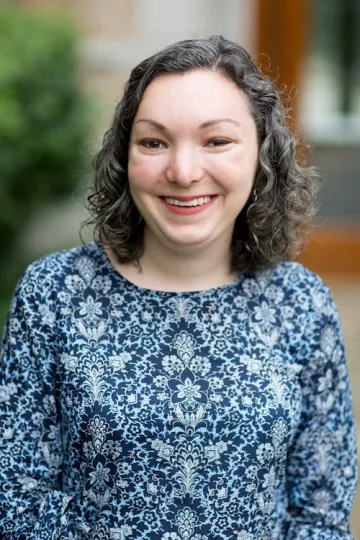
Katelyn Carothers, PhD
Clostridioides difficile is a “bad” bacterium that causes severe diarrhea and inflammation in the colon. Nearly half a million infections are caused by C. difficile in the U.S. each year, with the majority occurring in healthcare settings. Disease caused by this pathogen is usually preceded by antibiotic treatment, and it’s often recurrent and difficult to treat.
To better understand how C. difficile causes disease, Katelyn Carothers is studying a mutant strain of the bacteria: the MB-1 mutant strain produces less toxin, a crucial component to causing disease and hypersensitivity to a component of intestinal bile. Carothers hypothesizes that the mutant will not be infectious and might potentially be an effective oral vaccine candidate for disease prevention in veterinary animals.
The BIO5 fellowship will fund a project that addresses a crucial knowledge gap in her studies.
“This additional training will not only benefit me as a researcher but will help me to establish best practices for our laboratory and become a more effective mentor and teacher to future trainees,” she said. “Being highly trained in this line of work will also allow me to be more competitive in applications for postdoctoral and early-career grants through the NIH and USDA.”
Carothers is mentored by BIO5 members, professors, and co-directors of the Collaboratory for Anti-Infectives and Therapeutics Gayatri Vedantam and VK Viswanathan. Following her postdoc, she plans to teach and mentor undergraduate students in molecular biology and microbiology.
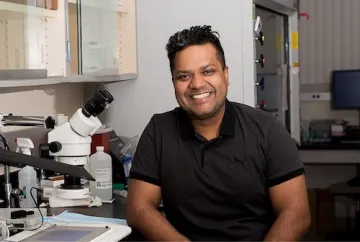
Joel James, PhD
Pulmonary arterial hypertension (PAH) is a complex, deadly disease of the blood vessels that has very limited treatment options. Joel James is studying the molecular mechanisms of a particular protein – AminopeptidaseN (APN) – that he has previously identified to be elevated in experimental models of PAH. This protein is an important player in diseases like cancer but has yet to be explored in this disease context. Better understanding the molecular mechanisms of this PAH through the role of APN will hopefully lead to better treatment options.
James’ BIO5 Postdoctoral Fellowship committee includes Ruslan Rafikov and Olga Rafilova, both associate professors of medicine, and Joe ‘Skip’ Garcia, professor in COM-T and BIO5. James’ mentoring committee will guide him in writing a competitive application for a K99/R00 award, which provides funding for outstanding postdoctoral researchers to finish their current work and launch their independent labs. The monetary portion of this award will also enable James to publish two first-author research papers, which will also support his transition towards an independent career.
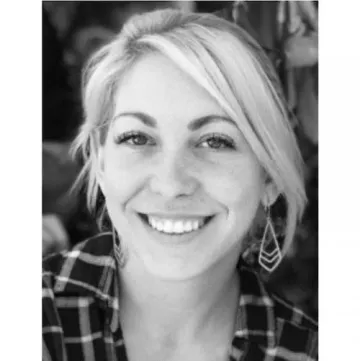
Linnea Linde-Krieger, PhD
Opioid use disorder (OUD) is on the rise among pregnant women, resulting in a sharp increase in adverse effects on the baby, including preterm birth, low birth weight, and infant withdrawal symptoms. Medication is currently the first line of treatment for pregnant and postpartum women with OUD, but side effects of these therapies often impact the mother’s natural stress responses, neural reward circuitry (oxytocin – the “feel-good” hormone), and sensitive response to her infant, ultimately impacting the mother-infant bond which has lifelong consequences.
Linnea Linde-Krieger aims to better understand how substances affect maternal brain hormones, and in turn, affect those of the infant. She’ll also work to understand how the altered biochemical bond between an opioid-exposed mother and child affects infant attachment.
Linde-Krieger is mentored by Alicia Allen, Director of the Recovery through ENgaging and Empowering Women (RENEW) team and assistant professor of family and community medicine, clinical translational sciences, public health, and BIO5; Stacey Tecot, associate professor of anthropology and BIO5; and Gregory Ditzler, associate professor of electrical and computer engineering.
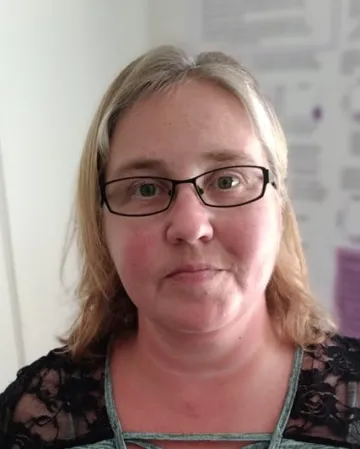
Sanna Loppi, PhD
Ischemic stroke is caused by a blood clot that completely or partially blocks a blood vessel in the brain. Due to extremely poor blood flow, cells near the blockage quickly die, followed by a chronic inflammatory response. Postdoctoral scholar Sanna Loppi aims to uncover the events that regulate this chronic inflammatory response with particular interest on metabolic regulators within immune cells.
With the BIO5 award, Loppi will attend two international conferences on brain metabolism. She plans to share her research and network with global leaders in the field. These connections will prove to be critical components of her future job search, as she one day hopes to study the intersection of stroke and metabolic diseases in her own lab.
Loppi is mentored by Kristian Doyle, BIO5 member and associate professor in the College of Medicine - Tucson, Rick Schnellmann, Dean of the College of Pharmacy and BIO5 member, Helena Morrison, associate professor in the College of Nursing, and John Purdy, assistant professor of immunobiology and member of BIO5.
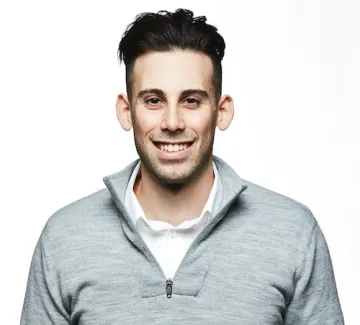
Jeffrey Melzer, PhD
Tiny, three-dimensional structures at the micrometer (thickness of a sheet of paper) or nanometer (one one-thousandth of a micrometer) size scale can be used in a variety of applications in fields like biological sensing and the detection of light particles. Existing methods to create these structures have numerous limitations, like the inability to easily combine different materials within a single structure.
To address this challenge and work towards creating structures that can be used in materials like specialized lenses and mirrors, postdoctoral fellow Jeffrey Melzer uses a light-based manufacturing method based on “optical tweezers” - a technology that uses a strongly focused laser beam to trap and precisely move small, sometimes delicate objects in three dimensions without causing damage. Melzer, who is mentored by Euan McLeod, associate professor of optical sciences and BIO5 member, is working on optimizing the system to accommodate smaller building blocks and improve process efficiency.
“This award enables me to travel to and present at a premiere optics conference where I can discuss my work with established researchers, as well as make valuable connections with individuals in both academia and industry. I hope that these discussions can generate exciting new ideas and directions for my research,” said Melzer. “In addition, the award helps me to pursue an independent research project related to my postdoctoral work which will enhance my skills and accelerate my development into an independent researcher.”
After completing his postdoc, Melzer plans to continue pursuing research in an industry setting, preferably in medical devices and biotechnology.
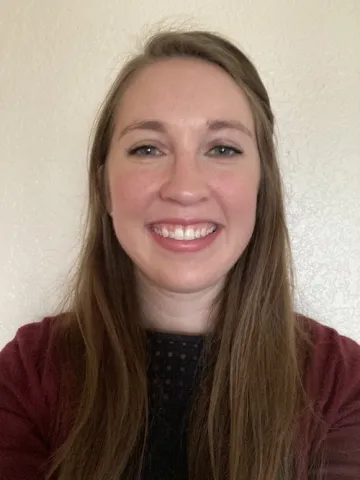
Michelle Persich, PhD
Emotional intelligence is the ability to understand, use and manage one’s own emotions to effectively communicate, empathize with others, overcome challenges, and diffuse stress. Postdoctoral fellow Michelle Persich is examining the effectiveness of an emotional intelligence training program that was designed to enhance essential skills necessary to maintain optimal mental health and well-being. Specifically, she studies the brain-based mechanisms that coincide with the observed changes in emotional abilities following completion of the program.
This award will provide Persich with support to better analyze and interpret her data, as well as network with other leaders in her field.
“The BIO5 Postdoctoral Fellowship will allow me to develop a sophisticated understanding of the software and statistical procedures needed to process and analyze neuroimaging data,” she said. “The fellowship will also allow me to attend conferences and develop relationships with mentors, providing opportunities for networking and learning about cutting-edge neuroimaging techniques.”
Ultimately, the BIO5 fellowship will support Persich’s goal of becoming a tenure-track faculty member. Persich is mentored by William Killgore, professor of medical imaging, psychiatry, and psychology at the BIO5 Institute.
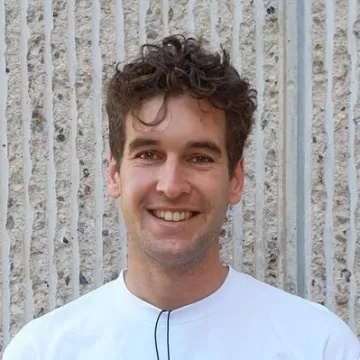
Henry Sanders, PhD
Many devastating diseases, including neurodegenerative disorders like Alzheimer's and Parkinson's, are classified as protein misfolding diseases in which specific proteins fail to maintain their functional 3D states. Researchers are trying to understand the molecular basis behind protein misfolding and toxicity, as there are no current preventatives for these diseases. Existing research suggests lipid cellular membranes (outer “shells” on cells) may hold the answer.
Henry Sanders develops and applies new methods to better understand the dynamics and structures of misfolded proteins. He is mentored by Michael Marty, BIO5 member, associate professor of chemistry and biochemistry, and world leader in studying these membrane-associated proteins with mass spectrometry by using tiny lipid-based particles known as nanodiscs. Sanders is leading a new direction in the lab by developing novel methods to complexity of current nanodiscs, which will provide more insight on protein interactions with themselves and lipids.
“This grant will allow me to attend conferences and workshops to develop a broader and more versatile skill set. Furthermore, it will enable me to network with potential employers, collaborators and scientists already in the field,” said Sanders, who is also mentored by Dr. Marielle Wälti at the National Institutes of Health and Dr. Joseph Loo at the University of California, Los Angeles.
Following the completion of his postdoc, Sanders plans to pursue a research career in the fields of protein chemistry and neurodegenerative disease.
